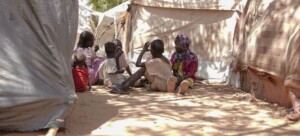Doctors: ‘Health condition collapse’ in Sudan’s Kassala as diseases spread
The Sudan Central Doctors’ Committee reports widespread prevalence of chikungunya* and dengue fever in Kassala state, pointing out that 48 per cent of the total pathology samples tested positive.
 The Aedes aegypti mosquito is the principal vector of dengue viruses (File photo: vectorbase.org)
The Aedes aegypti mosquito is the principal vector of dengue viruses (File photo: vectorbase.org)
The Sudan Central Doctors’ Committee reports widespread prevalence of chikungunya* and dengue fever in Kassala state, pointing out that 48 per cent of the total pathology samples tested positive.
The Ministry of Health of Kassala has confirmed the total number of suspected cases of haemorrhagic fever at 125, 30 of which have been confirmed through laboratory examination. Seven new cases were registered on Monday.
In a statement in Kassala this week, Noureldin Hussein, Director-General of the Health Ministry, said that dengue fever has become an endemic disease in the state. The cases are concentrated in Reefi Kassala, West Kassala, and Halfa El Jadeeda localities.
He acknowledged that efforts have been inadequate and that the epidemic has been beyond the capabilities of the state.
Hussein pointed to a lack of manpower in the campaign aimed at eliminating sources of vector breeding. He criticised the lack of rapid intervention by the federal Ministry of Health despite having been notified of the epidemic officially since August.
Hussein pointed out that the main health threats in the state are dengue fever, chikungunya, Rift Valley fever, cholera, and malaria.
‘Health condition collapse’
In a statement this week, the Sudanese Doctors Central Committee on the authorities to intervene immediately to avoid further worsening conditions, pointing to the complete collapse of health conditions in the state.
The Committee recommended the need to increase the number of emergency rooms in the Kassala Teaching Hospital and provide laboratory and diagnostic tests. They also appealed for intravenous solutions and analgesics, and support of periodic blood donation campaigns.
The Committee demanded the opening of temporary ambulatory camps in the districts to ease the pressure on the hospital, as well as calling to fight the vectors and break their course using known methods.
Members of neighbourhood committees and the Sudanese Professionals Association (SPA) in Kassala announced the launch of a march today to demand the dismissal of the director-general of the state Ministry of Health and the director of Kassala locality for their failure to play their role in combating these diseases since 2018, this as well as demanding attention to the need for accountability in all deficiencies.
Blood donation
In Khartoum and El Gedaref, blood donation campaigns have been launched for haemorrhagic fever patients from Kassala which will continue until tomorrow for the largest possible collection of donations.
The El Gedaref campaign is organised by neighbourhood committees, the El Shoroug Forum, the El Gedaref Students’ Association, and the Sudanese Media Group.
The Teachers Committee has begun to inform secondary school students of the importance of participating in the campaign.
*Chikungunya is a virus transmitted by the same kind of mosquito that spreads the dengue and zika viruses. It is characterised by an abrupt onset of fever, frequently accompanied by joint pain. There is no specific antiviral drug treatment for chikungunya. Treatment is directed primarily at relieving the symptoms, including the joint pain. Most patients recover fully within weeks, but in some cases joint pain may persist for several months, or even years. Serious complications are not common, but in older people, the disease can contribute to the cause of death. (Source: WHO)
Radio Dabanga’s editorial independence means that we can continue to provide factual updates about political developments to Sudanese and international actors, educate people about how to avoid outbreaks of infectious diseases, and provide a window to the world for those in all corners of Sudan. Support Radio Dabanga for as little as €2.50, the equivalent of a cup of coffee.












 and then
and then